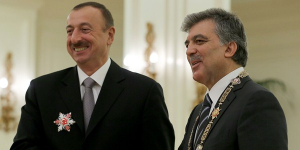Deepening Turkey-Azerbaijan Economic Partnership Creates Framework for Regional Bloc
By Micha’el Tanchum (vol. 7, no. 13 of the Turkey Analyst)
Turkey’s partnership with Azerbaijan in constructing the Trans-Anatolian Natural Gas Pipeline as well as Azerbaijan’s construction of a new oil refinery and container port on Turkey’s Aegean Coast is raising the level of Turkey’s economic partnership with Azerbaijan in the energy and transportation sectors to an unprecedented strategic level. This cooperation advanced further with new investment agreements concluded in late May and early June 2014. The deepening of the Turkey-Azerbaijan partnership is creating the framework for the emergence of wider Caspian-Anatolian regional cooperation.

Turkey-Azerbaijan Summit Consummates Reconciliation
By Richard Weitz (vol. 5, no. 18 of the Turkey Analyst)
Turkish-Azerbaijani relations have been on the rebound in recent months since the Turkish-Armenian reconciliation effort, launched in 2008, has effectively collapsed over differences regarding the Armenian-occupied territories of Azerbaijan and the disputed region of Nagorno-Karabakh. The summit earlier this month between the two governments will accelerate this process, especially by helping them develop their energy partnership.
Normalizing Turkish-Armenian Ties: Will Davutoglu's Gamble Pay Off?
By Svante E. Cornell and M.K. Kaya (vol. 2, no. 16 of the Turkey Analyst)
In its laudable attempts to reduce tensions with its neighbors and to gain a greater influence in the South Caucasus, the AKP government has made itself dependent on forces that it cannot control. Unless Armenia and Azerbaijan strike a deal rapidly, Turkey will inevitably be forced to choose between reneging on its commitment to normalize relations with Armenia or risk a breakdown in its relations with Azerbaijan. In either situation, Moscow will be the geopolitical winner. Western, in particular American, activity to support an agreement on principle between Armenia and Azerbaijan is urgently called for.
Ankara's Growing Realism on the Nabucco Project
By M.K. Kaya and Svante E. Cornell (vol. 2, no. 10 of the Turkey Analyst)
The Nabucco pipeline is key to Europe’s diversification of natural gas supply, but faces numerous problems. Turkey has been a problem country for Nabucco given the low level of coordination of Turkish policy on the issue and Ankara’s exaggerated demands. Nevertheless, Ankara now appears to have adopted a more realistic policy. However, Ankara’s stance on Nabucco and its rapprochement with Armenia did considerable damage to the project by putting into question Azerbaijan’s participation. Indeed, while Turkey appears less of a problem than a few months ago, the ball is now in Baku.
Erdogan, Azerbaijan and the Armenian Question
By Svante E. Cornell (vol. 2, no. 7 of the Turkey Analyst)
The past several weeks have seen the level of diplomatic rumoring on a Turkish-Armenian rapprochement reach new heights. The Turkish government embarked on this endeavor seriously last Summer, a move that could redraw the geopolitics of the Caucasus in unpredictable ways, depending on how it is undertaken. While the initiative had much to do with Turkish-US relations, the Obama visit paradoxically coincided with Ankara being forced to hit the brakes on the issue, at least temporarily. It has once again been made clear that the Armenian-Azerbaijani conflict remains the major security challenge in the region, and that it needs to be tackled head on.


